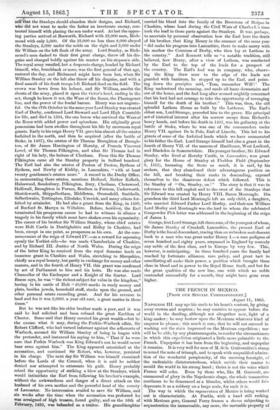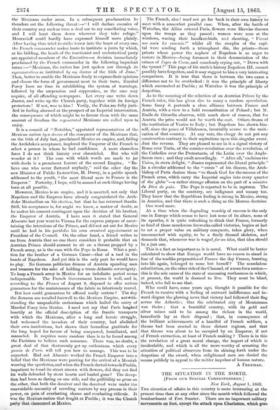THE FRENCH IN MEXICO.
[FROM OUR SPECIAL CORRESPONDENT.]
August 11, 1863. NAPOLEON III. may ape his uncle to his heart's content, by giving away crowns and sceptres; he may contrive to appear before the world in the darzling, although not altogether new, light of a king-maker; he may bestow upon the Mexicans whatever kind of emperor he pleases ; this much is sure, that he will not succeed in washing out the stain impressed on the Mexican expedition ; nor will he be able, by any phantasmagoria, to render the circumstances in which this expedition originated a little more palatable to the French. Unpopular it has been from the beginning, and unpopular it remains. It is very well for men of M. de la Gueronniere's stamp to sound the note of triumph, and to speak with unqualified admira- tion of the wonderful perspicacity, of the unerring foresight, of the undeniable disinterestedness, which entitle their master to mould the world in his strong hand; theirs is not the voice which France will echo. Even by those who, like M. Gueroult, are enamoured of glory in the Napoleonic shape, the whole transaction continues to be denounced as a blunder, whilst others would fain deprecate it as a robbery on a large scale, for such it is.
The way in which the regeneration of Mexico is being worked out is characteristic. At Puebla, with a hand still reeking with Mexican gore, General Forey frames a decree subjecting to sequestration the immoveable, nay more, the moveable property of
the Mexicans under arms. In a subsequent proclamation he thunders out the following threat :—" I will declare enemies of their country any such as turn a deaf ear to my conciliating voice, and I will hunt them down wherever they take refuge." Mouravieff could hardly have expressed himself more plainly After having thus tried to strike terror into the heart of every one, the French commander makes haste to institute a junta by which, at his bidding, the heads of the reactioniat and ecclesiastical party are appointed members of the Executive—a decision immediately proclaimed by the French commander in the following impudent terms :—" Mexicans, the nation has just spoken out through its representatives as instituted by my decree of the 16th of June." Then, better to enable the Mexicans freely to express their opinions and choose the form of government most to their taste, Marshal Forey loses no timo in establishing the system of warnings, followed by the suspension and suppression, as the case may require, of all offending newspapers. Let every one write down Juarez, and write up the Church party, together with its foreign protectors ! If not, woe to him ! Verily, the Poles are fully justi- fied in feeling alarmed at the prospect of an Imperial intervention, the consequence of which might be to favour them with the same amount of freedom the regenerated Mexicans are called upon to enjoy.
It is a council of "Notables," appointed representatives of the Mexican nation by a decree of the conqueror of the Mexicans that, on the 10th of July last, proclaimed Mexico an empire, and, failing the Archduke's acceptance, implored the Emperor of the French to select a person in whom he had confidence. A more shameless farce I do not think history ever chronicled. But who will wonder at it? The ease with which words are made to jar with deeds is a prominent feature of the second Empire.. "Be- lieve one who never flattered anybody," said the other day the new Minister of Public Instruction, M. Duruy, in a public speech addressed to the youth, "the most liberal man in France is the Emperor." Posterity, I hope, will be amazed at such things having been at all possible.
However, Mexico is an empire, and it is asserted, not only that Napoleon and the Empress have already congratulated the Arch- duke Maximilian on his election, but that he has returned thanks Still, his acceptance is, for aught we know, a matter of doubt, as he makes his consent contingent upon the decision of his brother, the Emperor of Austria. I have seen it stated that General Almonte last year went to Vienna for the express purpose of ascer- taining the intentions of the Prince, and did not set out for Mexico until he had in his portfolio his own eventual appointment as President of the Council. On the other hand, a friend writes to me from Austria that no one there considers it probable that an Austrian Prince should consent to sit on a throne propped by a French army, as is the case with the Pope in Rome. What a posi- tion for the brother of a German Car—that of a tool in the hands of Napoleon. And yet this is the only part he would have to play. No German politician dreams of Austria spending men and treasure for the sake of holding a trans-Atlantic sovereignty. To keep a French army in Mexico for an indefinite period seems indispensable. The French Government knows it well, and is, according to the France of August 9, disposed to offer serious guarantees for the maintenance of the fabric so laboriously reared.
But how could guarantees be offered really serious ? The day the Zouaves are recalled farewell to the Mexican Empire, notwith- standing the unspeakable enthusiasm which hailed the entry of Marshal Forey into Mexico. I need not say that Paris laughed heartily at the official description of the frantic transports with which the Mexicans, after a long and heroic struggle, had welcomed the invaders of their country, had abolished their own institutions, had shown their boundless gratitude for the long hoped for favour of being conquered, humiliated, and manacled. It requires more candour than is to be found among the Parisians to believe such nonsense. There was, no doubt, a great deal of that dexterously got up enthusiasm which every gamin de Paris will tell you how to manage. This was to be expected. Had not Almonte worked the French Emperor into a belief that the Mexicans were panting for the arrival of a Messiah wearing the epaulettes, and when the French darted towards Puebla, impatient to tread its street strewn with flowers, did they not find its walls defended by stout hearts and loaded guns? The decep- tion had been so daring on one aide, and the gullibility so gross on the other, that both the deceiver and the deceived were under the unavoidable necessity of mending matters by any process in their power, on pain of everlasting shame and everlasting ridicule. It was the Mexican nation that fought at Puebla ; it was the Church party that clamoured at Mexico. The French, alas ! need not go far back in their own histo.ry to meet with a somewhat parallel case. When, after the battle of Waterloo, the Allies entered Paris, flowers were likewise thrown upon the troops as they passed ; women were seen at the windows, waving their handkerchiefs, and shouting, " Vivent nos tads lee ennemis !" whilst all the steeples of the capi- tal were sending forth a triumphant din, the priests—those priests whose power the nephew of Napoleon is so eager to restore in Mexico—being foremost in their denunciation of the crimes of l'ogre de Corse, and ceaselessly crying out, "Down with the tyrant !" This page of his uncle's history Napoleon III. cannot possibly have forgotten, and it may suggest to him a very interesting comparison. It is true that there is between the two eases a difference not to be overlooked : it was the principle of liberty which succumbed at Puebla ; at Waterloo it was the principle of despotism.
As to the meaning of the selection of an Austrian Prince by the
French ruler, this has given rise to many a random speculation. Some fancy it portends a close alliance between France and Austria, with a view to a bold reconstitution of Poland ; but M . Emile de Girardin observes, with much show of reason, that for Austria the prize would not be worth the cost. Others dream of the restitution of Venice to Italy ; but Napoleon has shown him- self, since the peace of Villafrance, invariably averse to the unifi- cation of that country. At any rate, the clergy do not put any construction contrary to their aspirations upon this singular event. Just the reverse. They are pleased to see in it a signal victory of Rome over Turin, of the counter-revolution over the revolution, of the Catholics over the Protestants, of the Latin over the Anglo- Saxon race ; and they exult accordingly. "After all," exclaims the Union, in stern delight, "Juarez represented the liberal principle." In a circular addressed to the " cures " of his diocese, the Arch- bishop of Paris desires them "to thank God for the success of the French arms, which carry the Imperial eagles into every quarter of the globe "—a rather strange effusion on the part of a ministre du Dieu de pair. The Pope is reported to be in raptures. The Liberal party, on the contrary, are indignant and uneasy too. They know that the Republican feeling is strong in Mexico, strong in America, and that there is such a thing as the Monroe doctrine
One word more.
At a time when the degrading worship of success is the only one in Europe which seems to have lost none of its altars, none of its apostles, it is quite refreshing to think that France, formerly so fond of those murderous fireworks called victories, begins at last to set a proper value on military conquests, takes glory, when unconnected with equity, to be a finely dressed skeleton, and demands that, whenever war is waged for an idea, that idea should be a just one.
This is a fact as important as it is novel. What could be better calculated to show that Europe would have no reason to stand in fear of the warlike propensities of France the day France, bursting into life again, belonged to none but herself? The scandalous substitution, on the other sideof the Channel, of aman fora nation— this is the sole cause of the state of unceasing restlessness in which, at present, the world is doomed to live. They must be blind, indeed, who fail to see that.
Who could have, some years ago, thought it possible for the French to receive with a 'feeling of outward indifference and in- ward disgust the glowing news that victory had followed their flag across the Atlantic ; that the celebrated city of Montezuma was theirs ; that a beautiful country, with its gold and silver mines said to be among the richest in the world, henceforth lay at their disposal ; that, in consequence of the brilliant achievements of a handful of French soldiers, a throne had been erected in those distant regions, and that that throne was about to be occupied by an Emperor, if not of French extraction, at least of French making ? There is in this the revelation of a great moral change, the import of which is incalculable, and which is all the more worthy of arresting the attention of political observers from its shining forth under the despotism of the sword, when enlightened men are denied the means publicly to appeal to the nobler impulses of human nature.
A FREEMAN.































 Previous page
Previous page